
Marianne Rosenberg is a German Schlager music singer and songwriter.
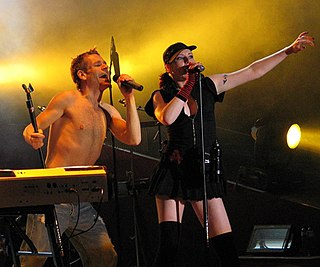
Rosenstolz was a German pop duo from Berlin that was active between 1991 and 2012 and had chart hits in Germany, Austria and Switzerland. The duo consisted of singer AnNa R. and musician Peter Plate, who occasionally provided vocals. Rosenstolz achieved major chart success after the nineties, with five studio albums going to No. 1 in the German albums chart. Although the duo split up to pursue separate music careers, they left open the possibility of a future reunion.

Ireen Sheer is a German-English singer. She had her first major hit in 1970 with Hey Pleasure Man. She had a top five hit on the German singles chart with "Goodbye Mama" in 1973. She went on to finish fourth at the Eurovision Song Contest 1974 representing Luxembourg, sixth at the Eurovision Song Contest 1978 representing Germany, and thirteenth at the Eurovision Song Contest 1985 representing Luxembourg again.
Die Flippers were a German Schlager group formed in 1964. They were one of the most successful Schlager groups of all time, and have been constantly recording and releasing new music since their self-titled debut album was released in 1970. They have released 45 albums, 5 of which have gone platinum, 24 gold. They have won 11 Goldene Stimmgabel awards in 1988, 1991, 1994, 1995, 1996, 1998, 1999, 2000, 2002, 2003 and 2004.
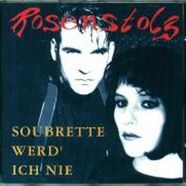
Soubrette werd' ich nie is the debut album by German pop duo Rosenstolz, released in 1992 by Pool. The album was not a commercial success following its initial release. However, the 2007 re-release reached No. 93 in the German albums chart.

Macht Liebe is the eighth studio album by German pop duo Rosenstolz, released in 2002 by Polydor Records. Featuring a mix of electropop and ballads, the album reached gold status in Germany.

"Total Eclipse" / "Die schwarze Witwe" is a double A-side single released in 2001 by German pop duo Rosenstolz, featuring guest singers Marc Almond and Nina Hagen. The single reached No. 22 in the German singles chart.

Peter Plate is a German musician, singer, songwriter and record producer. Between 1991 and 2012, he was the keyboardist and occasional vocalist of Rosenstolz, a German pop duo that had chart hits in Germany, Austria and Switzerland.

Andrea Neuenhofen, better known by her stage name AnNa R., is a German singer and songwriter who provides the lead vocals for pop group Gleis 8. She was previously the main vocalist of Rosenstolz, a pop duo that was active between 1991 and 2012 and had chart hits in Germany, Austria and Switzerland.

The discography of Rosenstolz, a German pop duo from Berlin, includes 12 studio albums and at least 40 singles, released between 1992 and 2012. The band also released a number of live albums, six compilation albums and video albums.
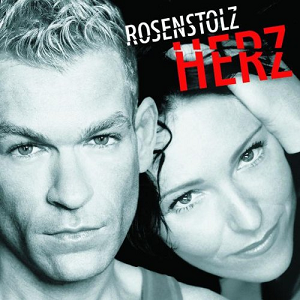
Herz (Heart) is the ninth studio album by German pop duo Rosenstolz, containing songs representing the different sides of love. Released in 2004 by Island Records, the album reached triple platinum status in Germany. It also yielded four top 20 hits in the German singles chart.

Zucker (Sugar) is the sixth studio album by German pop duo Rosenstolz. Released in 1999 by Polydor Records, it was the first Rosenstolz album to enter the top 10 of the German albums chart.

Die Schlampen sind müde is the fifth studio album by German pop duo Rosenstolz. Released in 1997 by Polydor Records, it was the first Rosenstolz album to enter the German albums chart.
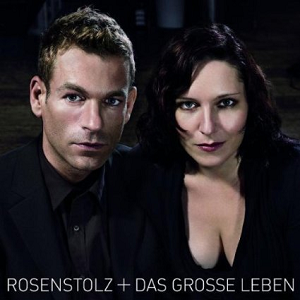
Das große Leben is the tenth studio album by German pop duo Rosenstolz, released in 2006 by Island Records. Consisting mostly of ballads, the album topped the German and Austrian albums charts and became Rosenstolz's biggest selling album, with over one million copies sold. Five singles from the album were top 20 hits in Germany.

Die Suche geht weiter is the eleventh studio album by German pop duo Rosenstolz. Released in 2008 by Island Records, the album reached No. 1 in the German and Austrian albums charts and No. 2 in the Swiss albums chart.
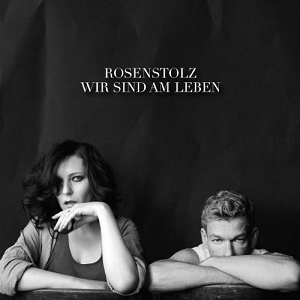
Wir sind am Leben is the twelfth and final studio album by German pop duo Rosenstolz. Released in 2011 by Island Records, the album reached No. 1 in the German and Austrian albums charts and No. 3 in the Swiss albums chart.

Alles Gute is a compilation album by German pop duo Rosenstolz, featuring a selection of songs from the early part of the band's career during the nineties. Following its initial release in 1998 by Polydor Records, the album reached No. 10 in the German albums chart. The album was later re-released in 2001 with a bonus CD containing newer songs.

Live aus Berlin is a live album by German pop duo Rosenstolz that was recorded in the Columbiahalle in Berlin during the band's 2002 Macht Liebe tour. The album was released in 2003 by Island Records on single CD, double CD, and DVD.

Willkommen in unserer Welt is a live video album by German pop duo Rosenstolz, released on DVD in 2004 by Island Records. The recording was done during the band's 2004 Herz tour at the final concert, which took place at Kindl-Bühne Wuhlheide, an open-air venue in Berlin.
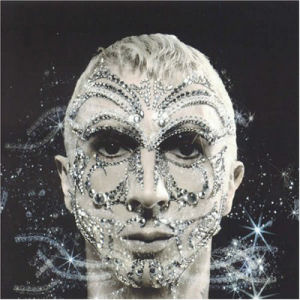
Stranger Things is the eleventh solo studio album by the British singer/songwriter Marc Almond. It was released by Blue Star Music, in conjunction with XIII BIS Records, on 18 June 2001.


















